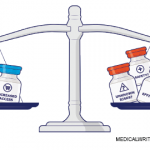The high out-of-pocket costs of biologic disease modifying antirheumatic drugs (DMARDs) place “enormous financial strain” on Medicare beneficiaries and may limit therapy adherence, according to the lead author of a national investigation into Part D coverage and cost-sharing structures.
Recently published online in Arthritis & Rheumatology, the study analyzed 2,737 Part D plan formularies for DMARD coverage, prior authorization (PA) requirements and copayments. The study showed 100% of plans covered at least one biologic DMARD, but 95% required a PA and 81% required coinsurance (approximately 30% of drug cost) rather than a fixed co-payment.1 The mean out-of-pocket cost for biologic DMARDs ranged from $2,712 to $2,774 annually. In contrast, six of nine non-biologic DMARDs were covered by 100% of Part D plans without PAs at fixed copayments of $5 to $10 per month.
“Medicare patients with Part D pharmacy coverage face very high out-of-pocket costs for biologics,” says Jinoos Yazdany, MD, MPH, a rheumatologist at the University of California at San Francisco and chair of the ACR’s National Registry Research and Publications Committee. “High drug costs may limit adherence and put an enormous financial strain on patients. It is important for cost discussions to be part of RA clinical care.
“For many patients, lower cost oral DMARDs are very effective,” Dr. Yazdany adds. “These should be tried first. For patients needing higher cost biologic DMARDs, having accurate information handy to discuss potential out-of-pocket costs and determining what the patient is comfortable paying, are important until policy reforms can address high out-of-pocket costs.”
Dr. Yazdany, formerly co-chair of the ACR’s Quality Measures Subcommittee and currently serving on the National Quality Forum’s Health Professionals Council, says this study confirms that U.S. health policy is placing a massive financial burden on patients with RA.
“We were surprised to see such high out-of-pocket costs and so little variation in coinsurance requirements (30%) across plans,” she says. “This may be because there is no incentive for plans to offer more generous benefits, since that would risk drawing sicker patients. This study suggests that competition in the healthcare market is unlikely to lead to a significant reduction in out-of-pocket costs for RA patients. Other approaches are urgently needed.
“The way Medicare pays for biologics is complicated,” she says. “For example, obtaining biologic drugs under Medicare’s medical benefit, which covers facility-administered drugs, is often less expensive than obtaining similar drugs in the Part D pharmacy benefit.”
Dr. Yazdany urges patients to talk with their rheumatologists about costs and alternatives, and for rheumatologists to encourage their patients to research all of their coverage options.
Richard Quinn is a freelance writer in New Jersey.
Reference
1. Yazdany J, Dudley RA, Chen R, et al. Coverage for high-cost specialty drugs for rheumatoid arthritis in Medicare part D. 2015. Arthritis Rheumatol. Jun;67(6):1474–1480.

